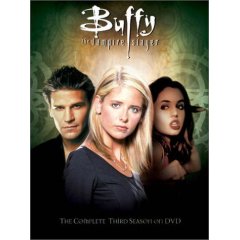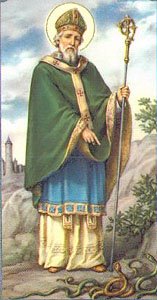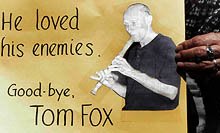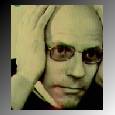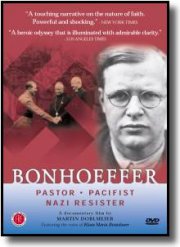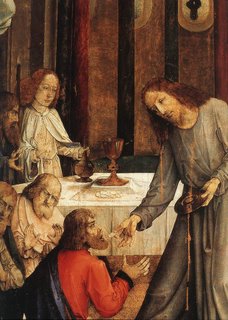 My Mum's a big Oprah fan, and Im a big Bono fan. So when today she played me a tape of Oprah shopping with Bono at the launch of the Red campaign in Chicago, we both should have been pleased. Now I've been an admirer of Bono for about 25 years. I don't for a moment question his motives, and realize that having seen the Aids crisis in Africa close-up he's willing to make a complete idiot of himself if it means getting drugs to people in desparate straits. Now, I really admire that. However, what I saw on Oprah made my stomach rather queezy. (And not only mine). Imagine the idea of guilt-free shopping... shopping that will save the world (and make a hell of a lot of money for The Gap, Apple, Converse, Motorola, and Armani)! Great publicity for the corporates. And imagine people coming into a store to buy a red shirt and coming out with much more besides. On the Oprah show, it was like a drunken orgy of shop-till-you-drop, but with no head-splitting hangover. Oprah buying ten of everything (with Bono sheepishly following behind) then turning to the audience with tear-filled eyes (intercut heart-breaking pictures of Aids orphans) saying buy red and save lives.
My Mum's a big Oprah fan, and Im a big Bono fan. So when today she played me a tape of Oprah shopping with Bono at the launch of the Red campaign in Chicago, we both should have been pleased. Now I've been an admirer of Bono for about 25 years. I don't for a moment question his motives, and realize that having seen the Aids crisis in Africa close-up he's willing to make a complete idiot of himself if it means getting drugs to people in desparate straits. Now, I really admire that. However, what I saw on Oprah made my stomach rather queezy. (And not only mine). Imagine the idea of guilt-free shopping... shopping that will save the world (and make a hell of a lot of money for The Gap, Apple, Converse, Motorola, and Armani)! Great publicity for the corporates. And imagine people coming into a store to buy a red shirt and coming out with much more besides. On the Oprah show, it was like a drunken orgy of shop-till-you-drop, but with no head-splitting hangover. Oprah buying ten of everything (with Bono sheepishly following behind) then turning to the audience with tear-filled eyes (intercut heart-breaking pictures of Aids orphans) saying buy red and save lives.Needless to say, I was deeply bothered.
So here's my question: insofar as global capitalism is the nurturing soil of the empire that maintains Africa's people in bondage, is Bono not engaging in a massive legitimation of savage capitalism, and thereby assuaging the conscience of the Beast? Are not The Gap, American Express, and the like analogous to the cult parodied in Revelation 13 as the "False Prophet" who compells people to obtain a special mark, else they can neither buy nor sell? Can "ethical" capitalism save the world from the effects of "savage" capitalism? It reminds me of that other argument about [usually our] "righteous" and "just" violence saving the world from [usually their] "terrorist" violence.
Here's what complicates things even more. Anyone who's lived in Africa has seen the vibrant local and informal economies (following de Certeau we might call them economies of "space") insinuating themselves into "mainstream" places, doing battle with the shopping malls Oprah delights in, and selling fake Gap, Levis, and other wares. I remember well the traders that used to camp outside Cavendish Square in Claremont, Cape Town, creating a wonderfully African scene in the midst of Euro-posh elitism.) Here was a contestation of capitalism that was grassroots... and deeply subversive (as ongoing struggle over permits testified). Can it be that the Gaps and Converses of the world are feeling the pressure?
Maybe this is just sour grapes from someone who has also seen massive poverty in Africa and is aware of how much more he ought to be doing (or maybe it's plain old-fashioned Nietzschean raissentiment). I don't know. I do agree with those who say we should be suspicious of celebrity colonialism, even though they sometimes overstate their case. I'm also aware that such suspicion can easily mask either a sense of powerlessness at the scope of the problem or just plain suppressing justified guilt. After all, the migrant labour system that made gave Aids the opportunity to do its worst is the very same system that mined and drained the wealth of Africa and sent it northward.
George Grant used to warn his students "when you sleep with Nietzsche, it's always you that end up pregnant." Could the same be said of transnational capitalists? If so, I hope Bono's using protection. He'll be in my prayers. In the meantime I'll say no thanks to the red iPod (and the measly ten bucks Apple will send to Africa on my behalf) and look at more constructive avenues.
